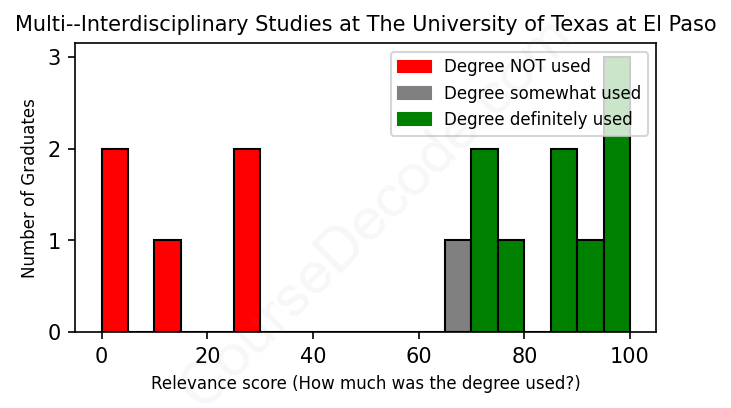
First, some facts. Of the Multi--Interdisciplinary Studies graduates from The University of Texas at El Paso we've analyzed , here's how many have used (or NOT used) their degree in their career:

These are estimates based on AI analysis of 15 LinkedIn profiles (see below).
The verdict? Below average. Overall, with an average relevance score of 61%, Multi--Interdisciplinary Studies graduates from The University of Texas at El Paso have a lower likelihood (-6%) of finding work in this field compared to the average graduate across all fields:
And for comparison, here's the chart for all profiles we've looked at across all degrees.
Also, after graduating, 46% of these graduates have pursued further education other than another Bachelor's degree (such as a Masters degree or other), compared to the average across all profiles of 35%. This suggests you may need more than just a Bachelors degree to be competitive as a Multi--Interdisciplinary Studies graduate.
See the details:
|
Relevance score: 27% We think this person has NOT gone into a career related to their degree. We think this person has NOT gone into a career related to their degree.
DEGREE INFOGraduated in 2018 from The University of Texas at El Paso with a Bachelor's degree in Multi--Interdisciplinary Studies. Also pursued further education since (see below). JOB HISTORY SINCE GRADUATIONInternship in Life Skills Office The University of Texas at El Paso Jan 2018 - May 2018 Internship in Univeristy of Arizona's Athletic Department  Univeristy Of Arizona Jun 2018 - Aug 2018 Instructional Specialist  Office of Student Athlete Development at Arizona State University Jan 2019 - May 2020 Settlement Coordinator  Zanes Law | Tucson and Phoenix Injury Lawyers Aug 2020 - May 2024 Lead Paralegal  Kurtz Riley Law Group May 2024 - Present FURTHER DEGREES DONE SINCE GRADUATINGMastersSandra Day O'Connor College of Law at Arizona State University 2018 - 2020 ABOUTNo information provided. |
The top 10 most common jobs done by the graduates we've analyzed (ranked most common to least) are:
Based on the careers of graduates from the Multi-Interdisciplinary Studies program at The University of Texas at El Paso, it seems that a significant number of them have gravitated towards roles in education, counseling, and community service. Many have found positions as teachers, school counselors, and educational coaches, where the knowledge and skills gained from their interdisciplinary studies directly apply to their daily responsibilities. For example, teaching roles at various school districts leverage educational theories and strategies that align well with the program's focus, making these positions quite relevant to their degrees.
However, not all the jobs held by these graduates are directly applicable to Multi-Interdisciplinary Studies. Some graduates have taken on roles such as logistics supervisors, customer service representatives, or even positions in the military that don't strongly align with the degree's core teachings. While these positions may involve skills that could be tangentially related, like leadership or problem-solving, they often lack a direct connection to the interdisciplinary focus of the program. Overall, it seems that while many graduates have found meaningful ways to use their education in roles that are relevant, there is a mixed bag of positions that may not fully utilize the interdisciplinary knowledge they acquired.
Here is a visual representation of the most common words in job titles for Multi--Interdisciplinary Studies graduates (this is across all Multi--Interdisciplinary Studies graduates we've analyzed, not just those who went to The University of Texas at El Paso):

When you look at the career trajectories of graduates from the Multi--Interdisciplinary Studies program at The University of Texas at El Paso, you can see a mix of paths that highlight both the advantages and challenges of the degree. Right after graduating, many of these individuals tend to secure roles in education, counseling, or community services, often reflecting a strong inclination toward helping professions. For example, graduates have taken up positions like teachers, school counselors, and community service managers, which suggests that they value direct engagement in their communities and social impact. There’s also a noticeable trend of graduates starting businesses or transitioning into leadership roles, although this isn’t universal.
Fast forward five to ten years, and you'll notice a bit more diversity in their career outcomes. While some have continued on successful paths—like those who climbed up the ranks in educational or counseling settings—others have found themselves in roles that may not be closely related to their original field of study. For instance, some alumni ended up in positions that are more administrative or even unrelated to their degree, such as customer service or logistics. It does seem like there’s a significant chunk who have managed to establish fulfilling careers that leverage the interdisciplinary skills they acquired during their studies, especially in areas like education, community advocacy, and non-profit work. However, the presence of folks who are still figuring things out—like those who are unemployed or in entry-level jobs—indicates that the journey post-graduation can be quite varied and dependent on additional factors like networking, internships, and personal interests.
Honestly, pursuing a Bachelor’s degree in Multi-Interdisciplinary Studies can be a mixed bag when it comes to the level of difficulty. It’s generally considered to be more flexible compared to some specialized degrees, which means you can often pick and choose courses that interest you, making it a bit easier to stay engaged. However, since you're blending different fields, you might find yourself juggling various subjects, which can be challenging if you're not great at time management or if you end up in a hard class from a field that isn’t your strongest suit. Overall, it tends to be a manageable degree if you're passionate about learning and willing to put in the effort.
Most commonly, in the LinkedIn profiles we've looked at, it takes people 2 years to finish a Bachelor degree in Multi--Interdisciplinary Studies.
Looking at the job histories of these UTEP grads, it seems like a mixed bag when it comes to making decent money. Some, like the grads involved in teaching or non-profit management, might not be raking in the big bucks, especially with roles in education and community services, which typically don’t pay a ton. On the other hand, the ones that have military experience or have moved into specialized positions—like the pharmacy operations manager—likely have better salaries compared to others. Overall, it seems that while some graduates are on a solid path toward good salaries, others might be settling for less financially, especially in fields that often come with lower pay, like education or entry-level roles. So, it really depends on the specific job and industry!
Here is a visual representation of the most common words seen in the "about" section of LinkedIn profiles who have a Bachelor degree in Multi--Interdisciplinary Studies (this is across all Multi--Interdisciplinary Studies graduates we've analyzed, not just those who went to The University of Texas at El Paso). This may or may not be useful:

Here are all colleges offering a Bachelor degree in Multi--Interdisciplinary Studies (ordered by the average relevance score of their Multi--Interdisciplinary Studies graduates, best to worst) where we have analyzed at least 10 of their graduates:
| College | Score | Count |
|---|---|---|
 Texas State University Texas State University
|
87 | 10 |
 Stephen F. Austin State University Stephen F. Austin State University
|
78 | 11 |
 University of North Texas University of North Texas
|
74 | 13 |
 Texas A&M University Texas A&M University
|
69 | 16 |
 The University of Texas at Arlington The University of Texas at Arlington
|
69 | 11 |
 University of Houston-Downtown University of Houston-Downtown
|
65 | 20 |
 University of Central Florida University of Central Florida
|
64 | 35 |
 The University of Texas at San Antonio The University of Texas at San Antonio
|
62 | 29 |
 Liberty University Liberty University
|
61 | 49 |
 The University of Texas at El Paso The University of Texas at El Paso
|
61 | 15 |
 San Diego State University San Diego State University
|
55 | 13 |
 West Virginia University West Virginia University
|
54 | 23 |
 Grantham University Grantham University
|
54 | 10 |
 Western Kentucky University Western Kentucky University
|
47 | 14 |
 Arizona State University Arizona State University
|
44 | 26 |
 Florida International University Florida International University
|
40 | 11 |